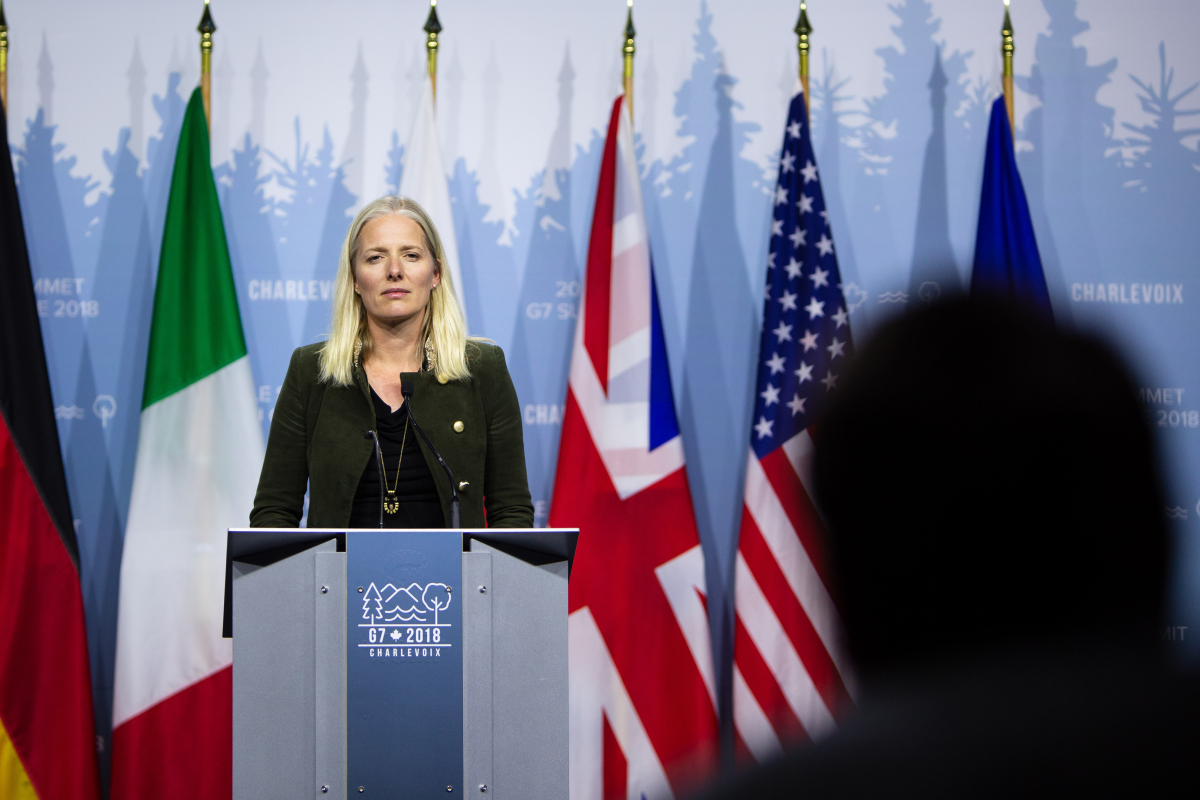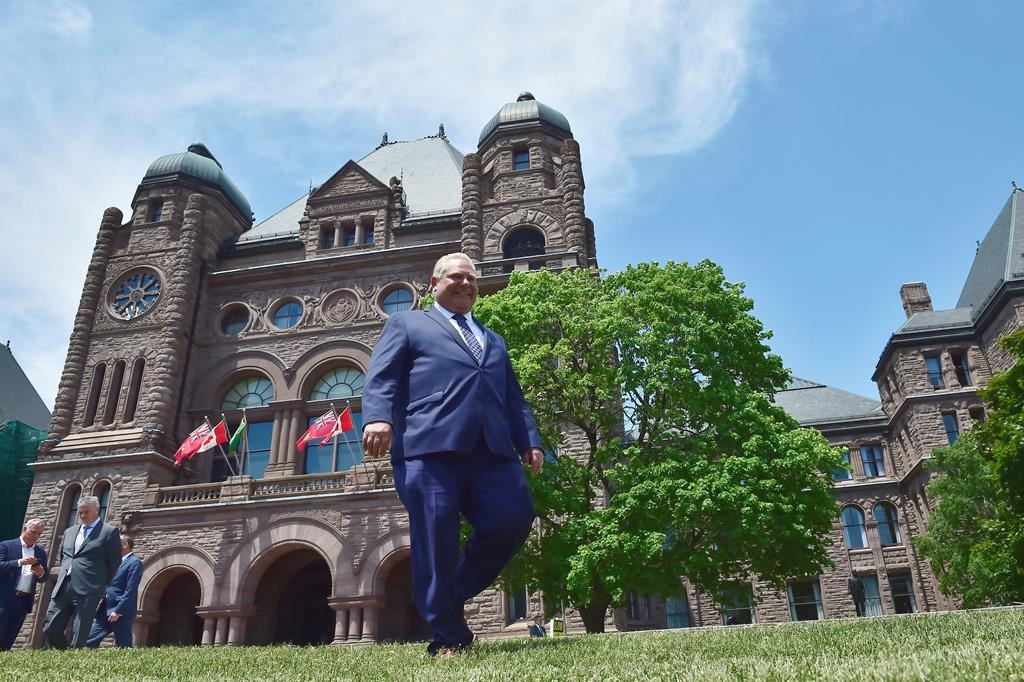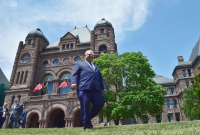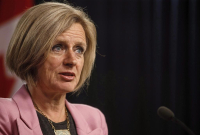Thank you for helping us meet our fundraising goal!
Ontario’s Progressive Conservative premier-designate Doug Ford said on Friday he was immediately pulling the province out of the cap-and-trade carbon market it shares with Quebec and California, and raising a war chest to fight the federal plan.
"We're going to stop the government from gouging the people," Ford said at a press conference, where he repeated a promise to cut 10 cents a litre off the price Ontario drivers pay at the pump and also said he'd go after gasoline distributors that hike prices before long weekends and holidays.
Still falsely using the term "carbon tax" — the province has no direct tax, but uses a market mechanism — Ford said Ontario would be serving notice of its withdrawal from the linked system, and that he was directing his incoming attorney general to "use all available resources" to challenge the federal carbon pricing plan in court.
Prime Minister Justin Trudeau's attempts to implement a nation-wide floor price on carbon pollution are part of Canada's efforts to address climate change and meet its international commitments under the Paris climate change accord.
Provinces will be allowed to establish their own carbon pricing policy, such as a cap-and-trade system or a carbon tax, and if they do not the federal government will impose a price.
“Today I want to confirm that in Ontario, the carbon tax’s days are numbered,” said Ford. “In fact, upon the swearing-in of my new cabinet at the top of our agenda, the very first item, will be to pass an order to cancel the Liberal cap and trade carbon tax.”
Ford and the Progressive Conservatives won a majority in the last election and are scheduled to be sworn in on June 29. Ford did not say when the provincial legislature would be called back.
Spot carbon market price drifts lower in aftermath
Asked about the possibility of lawsuits from investors and companies angry they had been made to invest in the program or to have otherwise lost money from the shift in policy, Ford said “the companies are going to be quite happy that they don’t have to pay for this.”
When it was pointed out to him that many of them had already paid, he replied that they “will be quite happy they don’t have to pay in the future.”
But the decision to move quickly to fulfill this particular campaign pledge will likely create turmoil in the secondary market, where those that have bought credits to release pollution in the future will feel compelled to sell them at a discount in Quebec and California as they now appear virtually worthless in Ontario.
The price of these credits has broadly ranged between $18 and $20 a tonne recently.
With the announcement light on specifics regarding how quickly Ontario could remove itself from the Western Climate Initiative, the spot market price only drifted lower in the immediate aftermath, heading towards its reserve price, the bare minimum each credit must be sold for at auction.
“There have not been any wild swings,” one carbon market trader said of the price slipping about five cents from its US$14.83 close on Thursday. “It feels like it’s going to go down some more,” the trader said, declining to be identified because they were not authorized to speak to the media.
“There’s more offers right now," added the trader, meaning that buyers were not rushing to transact at those levels and suggesting the price could fall further.

McKenna: Climate change impacts 'do not stop with a change in government'
Lisa De Marco is a leading environment lawyer who warned during the campaign that pulling Ontario out of cap and trade would likely cost the province between $2 billion and $4 billion.
After Ford's Friday announcement, she said she would "look to California and Quebec for prompt market stabilizing measures and guidance on the treatment of Ontario allowances" and for the Ford transition team "to ensure businesses and their customers are not harmed."
Quebec's environment ministry did not immediately respond to a request for comment.
The move also raised the risk that companies would seek redress from the provincial government for investments made in order to comply with the regulations, whether that was energy-efficient upgrades or purchases of credits.
And it puts Ford's PCs in direct confrontation with Ottawa, where the federal Liberal government was just able to pass bill C-74, which includes the carbon pollution pricing act, last night after a marathon voting session.
"A long night of voting but always happy to stand up for serious climate action," federal Environment and Climate Change Minister Catherine McKenna tweeted this morning. "We're taking serious action to tackle climate change and grow a clean economy. We owe it to our kids!"
McKenna has previously rejected a Tory theory that Ford's election victory was a "verdict" against carbon pricing, while constitutional experts say a fight against Ottawa on carbon pricing is likely doomed.
Manitoba and Saskatchewan are vowing a court challenge and Ford appears ready to jump into that ring too.
"Climate change is real and its impacts do not stop with a change in government," said McKenna's spokeswoman Caroline Theriault, reacting to Ford's announcement.
"Canadians expect us to take serious action to protect our environment and grow our economy. A price on pollution is an essential part of any serious climate plan — economists, industry, businesses and environmentalists agree. Pricing pollution works."
Theriault noted that the provinces that already have a price on pollution lead the country in economic growth, and revenues from Ontario’s cap-and-trade system are being put into programs to help businesses and households be more energy efficient and save money.
"Our kids and our grandkids deserve to inherit a healthy environment, a safe climate, clean air to breathe and a prosperous future," she said.
The Trudeau government's carbon pricing is set to be $10 a tonne starting in 2018 rising by $10 a year until it reaches $50 in 2022. On Thursday, the bill passed the Senate, one of the last remaining steps before it becomes law.
"The federal government's jurisdiction on this matter is clear," said Theriault, noting the bill's passage.
"Ontario's current pollution pricing system meets the federal standard. If the new government changes or eliminates its system, that assessment may change and the federal price on pollution would apply."
McKenna has previously said provinces have until the end of 2018 before it kicks in. The proceeds are due to be returned to the provinces in which they were raised. That price will apply to excess emissions, not every tonne that a factory or industrial facility emits.
"The industrial emissions pricing regime requires compliance reporting with respect to any facility that is covered by the regime," the legislation reads. "And the provision of compensation for any amount of a greenhouse gas that the facility emits above the applicable emissions limit during a compliance period."
In 2015, Canada's total greenhouse gas emissions were 722 megatonnes annually of carbon dioxide equivalent. The Paris climate accord commits the country to reducing that total to 517 megatonnes by 2030.

'Immediate withdraw' from future carbon auctions
The next auction for Ontario emission allowances was expected in August.
“I have already given our officials clear direction to immediately withdraw Ontario from future auctions for cap-and-trade credits,” Ford said, adding that he believed the policy framework that prices pollution “does nothing for the environment."
But his government-in-waiting likely can't do anything about the province allocating credits to that August auction, the carbon market trader said.
“The August auction, if you have Ontario’s volume in there, it’s a very big auction,” the trader said, estimating that some 107 million tonnes-worth of credits are likely to be made available. “But if you are an Ontario entity, are you really going to be participating in the August auction,” the trader asked rhetorically.
That could result in the upcoming auction either not selling out, or not meeting the reserve price of US$14.53. In May's auction it cleared that at US$14.65.
Ontario has held seven auctions since March 2017, raising almost $3 billion in revenues the previous Liberal government directed into other emission-reducing initiatives such as home retrofits and electric vehicle subsidies, as well as support for clean technology initiatives.
Those are likely next to get the chop, with Ford dismissing the measures as “programs that they had in the past, for instance, giving people that drive $80,000 cars credits.”
By comparison, Ford said his government had allocated $500 million to protect the environment, which in campaign documents was presented as an amount to be spread over the course of the four-year mandate.
It is still not clear whether Ford intends to use any sort of carbon pricing at all. On the campaign trail he said he would "come down hard" on polluters, but did not then nor has he since provided more detail.

Ford 'thumbing his nose' at clean economy, says Green leader
The cap-and-trade system currently operating as part of the Western Climate Initiative aims to lower greenhouse gas emissions by putting caps on the amount of pollution companies in certain industries can emit. If they exceed those limits they must buy allowances at quarterly auctions or from other companies that come in under their limits.
The cap declines about four per cent each year to 2020, and as it decreases, the government hopes companies have more incentive to cut their emissions.
While each jurisdiction runs its own auctions, any participant in any of the three linked markets can buy and sell credits on a common secondary market. Some $2 billion in credits that have been bought but not used now appear to be stranded assets.
Green Party of Ontario Leader Mike Schreiner, who won the party's first seat in Ontario's legislature in the June 7 election, said Ford's move was "reckless" and that he was "thumbing his nose at the $6 trillion dollar clean economy."
“Doug Ford’s move to cancel a price on pollution is bad for Ontario and bad for business," he said in an emailed statement. "Canceling pollution pricing without a backup plan unfortunately sends a signal to clean companies that Ontario is not open for business."
He said he had his own issues with the current system, especially its exemption for Ontario’s largest polluters, and that the Green Party is calling for a gradual phase out of cap-and-trade in favour of a revenue neutral fee-and-dividend system.
Editor's note: This story was updated on June 15, 2018 at 11:40 a.m. ET, and again at 1:19 p.m., 1:46 p.m., 3:18 p.m. and 4:17 p.m. the same day, to include additional information from Ford's appearance, as well as reaction and context.







Comments
Doug Ford is a climate change denier and doesn't care about the environment.
"We're going to stop the government from gouging the people," Ford said at a press conference on Friday.
==============
The problem with Ford, and the vast horde of 'the disgruntled' is that some day you have to tackle the hard work of trying to be a good government instead of just complaining, trash-talking and tearing down.
Some of the better Ontario Conservatives should grab him and explain to him that he is the government, now. Draw him a picture if you have to.
When are our federal Liberals going to let us know what individual Canadians will be paying for the carbon tax...or is it supposed to be a surprise? Unlike government, taxpayers need to stick to a household budget and need to know their costs to do so.
Doug Ford says that he will "come down hard" on polluters. If he is truthful to its commitment, he should get rid of his gas guzzling SUV and buy an electric vehicle. In Ontario, consumer preferences for passenger light trucks, large vans and SUV's (like the one that Mr. Ford drives) are responsible for the rise of GHG emissions in the transportation sector.
In Ontario, GHG emissions from the transportation sector went from 44.6 megatonnes (Mt) of carbon dioxide equivalent (CO2 e) in 1990 to 60.5 Mt in 2015, an increase of 35.7%. Emissions from passenger transportation were 34.8 Mt in 2015 compared to 29.2 Mt in 1990.
While GHG emissions from cars went down from 19.7 Mt in 1990 to around 15.0 Mt in 2015, emissions from passenger light trucks (includes pickup trucks, large vans and SUV'S) grew from 4.9 Mt in 1990 to roughly 13.5 Mt in 2015, an increase of more than 175%.
Since the transportation sector in Ontario is the largest contributor of GHG emissions in the province, Doug Ford should "come down hard" on people who buy big cars and consume a lot of gasoline; but , on the contrary, by reducing the price of gasoline, he wants those people to burn more fuel and pollute more.